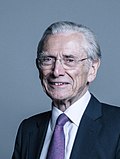8 June 2016 | |||||||||||||||||||||||||
| |||||||||||||||||||||||||
| |||||||||||||||||||||||||
An election for Lord Speaker, the presiding officer of the House of Lords, took place on 8 June 2016, with the result announced on 13 June. [1] Incumbent Baroness D'Souza, who was at the end of her first term, announced on 11 February that she would not be standing for re-election. [2]


